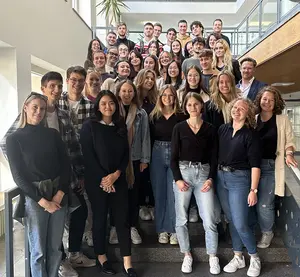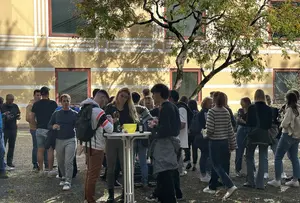MSc in Economics and Development
The University of Bamberg offers together with the University of Florence a double degree programme as part of the MSc in European Economic Studies / Economics and Development.
The University of Florence is an important and influential centre for research and higher training in Italy, with 1,800 lecturers and internal research staff, 1,600 technical and administrative staff, and over 1,600 research assistants and doctoral students.
It offers a wide range of study programmes at various levels and in all areas of knowledge. Over 130 degree courses (First and Second Cycle, corresponding to Bachelor's and Master's Degrees) organised in 10 schools, with a population of about 51,000 enrolled students. Each year there are over 9,000 degrees awarded in Florence.
The MSc in Economics and Development offers lessons and research projects in the heart of Florence, one of Italy’s most attractive cities, known all over the world for its cultural, architectural, artistic heritage and its high standard of living. With its interdisciplinary approach to the teaching of economics and an excellent student to staff ratio, this MSc offers an international environment thanks to its students which come from all over the world.
Upon completion of the double degree programme, the University of Florence awards the academic degree
- Master of Science in Economics and Development
and the University of Bamberg awards the academic degree
- Master of Science in European Economic Studies
Students starting the programme in Bamberg (Bamberg = home institution)
Application and Admission
If you would like to begin your studies in Bamberg (home institution), admission is always possible in the winter semester. The application for double degree programmes is made as part of the application for the Master's degree programme in European Economic Studies and is integrated into the online application for the degree programme during the application phase. Unfortunately, we cannot accept applications from students who are already enrolled on the Master's programme. Further information about the online application procedure and the admission requirements can be found here:
>>>Application for a Master´s degree
Please note the shorter application deadlines for the double degree programmes: Applications for the winter semester 2025/26 will be possible from mid-May when the online portal for Master's applications opens. The application deadline ends on
22.06.2025
In addition to the regular application documents, you must submit the following:
- Letter of motivation in German
- Curriculum vitae
- Proof of language skills (B2 in English)
At the time of application, in addition to the usual recognised language certificates, school or university certificates, for example, are also accepted. For registration at the partner university, which takes place in the first semester (usually at the end of November), an official and up-to-date language certificate must then be provided. The registration for the second year at the partner university as well as the examination for an Erasmus scholarship is organised by the International Office of the University of Bamberg during the first semester. The following language certificates are currently accepted by the International Office:
- TOEFL ibT with at least 80 points
- IELTS Academic with at least 6.5 points
- Cambridge First Certificate (FCE), level B2
- Cambridge Certificate in Advanced English (CAE), level C1
- Cambridge Certificate of Proficiency in English (CPE), level C2
- In addition, the free language test of the Bamberg Language Centre with a result of at least B2 is accepted.
Knowledge of Italian is not mandatory, but is considered desirable. Students who would like to build up their Italian language skills in the first year are recommended to attend the specialised language training at the Language Centre of the University of Bamberg:
>>>Information on the language training at the language center of the University of Bamberg
Please refer to the study and examination regulations for the requirements for participation in the Master's programme in European Economic Studies.
>>>Study and examination regulation
>>>Further information on the degree programme and admission
Admission to a double degree programme at the University of Bamberg is usually only provisional until admission is granted by the partner university. Admission can only be granted during the first year in Bamberg, as it is dependent on other criteria (study progress, language tests, etc.).
If you receive a letter of admission for one of the Master's degree programmes, but no place on a double degree programme, your admission to the regular Master's degree programme remains valid. You will then still have the opportunity to apply for a regular study abroad programme.
After selection by the home university and receipt of the letter of admission from the partner university, students are admitted to the double degree programme. Admission by the partner university is usually a formality and does not require a separate selection procedure. Applications for the double degree programme that are sent directly to a partner university will not be accepted.
Students starting the programme in Florence (University of Florence = home institution)
Admission to the second year of study
If you have started your studies at the University of Florence (as your home university) and come to Bamberg for your second year of study, you will have to go through a simplified admission process. This begins with you being nominated by your home university. You will then receive all the information you need from the International Office (IO) of the University of Bamberg to prepare for your academic year in Bamberg (halls of residence, introductory and language courses, etc.). Further information on these topics can also be found on the homepage of the IO:
>>>Prepare your stay in Bamberg
Unlike regular exchange students, double degree students are regularly enrolled in Bamberg. You must submit an application via the online application procedure of the Registrar's Office. You will receive an email with all important information and deadlines after your nomination. Please wait until you are contacted by the SoWi double degree coordinator. You will then find the online application here:
There will also be an introductory event for double degrees at the SoWi at the beginning of the semester where you will have the opportunity to get to know other students who are also studying for a double degree. You will also receive a personal invitation by email.
Degree Programme
The study programme comprises 4 semesters. Students spend the first two semesters (or Master 1, Bac + 4) at their home university and the last two semesters (or Master 2, Bac +5) at the respective host institution. During their stay at the host institution, students remain enrolled at their home university. The credits earned as part of the double degree programme are recognised as equivalent by both institutions.
Distribution of credits in the Master in European Economic studies
The distribution of ECTS in Bamberg is the following:
| Starting in Bamberg | Starting in Florence | |||
| Module group | 1st year in Bamberg | 2nd year in Florence | 1st year in Florence | 2nd year in Bamberg |
| MAEES1 Core Curriculum: Economic Theory and Methods | 24 | - | 18 | 6 |
| MAEES2 Foreign Business Languages | - | 12 | 12 | - |
| MAEES Specialisation | 36 | 24 | 30 | 30 |
| MAEES12 Master Thesis | - | 24 | - | 24 |
| Total ECTS | 120 | 120 | ||
The programme details mainly depend on whether the student starts the programme in Bamberg or in Florence. The following overview is designed for planning and orientation, while the individual programme details result from the individual recognition agreement students reach with the programme coordinators at both universities based on the current versions of the studying and examination rules in place for the underlying programmes. The courses currently offered in Bamberg are defined by the current version of the module handbook.
>>>Current course offer in Bamberg (Module Handbook M. Sc. EES)
The following tables provide information about the allocation of modules from Florence to the module groups in Bamberg as well as about the choice options for students within the program:
Students who start the program in Bamberg
MAEES1 Core Curriculum: Economic Theory and Methods
1. year Bamberg | 2. year Florence | |
|---|---|---|
| MAEES1.1 Advanced Microeconomics | 6 | |
| MAEES1.2 Advanced Macroeconomics | 6 | |
| Mathe-M-01: Advanced Mathematical Methods | 6 | |
| One of the following courses: | ||
| SuStat-014-M: Advanced Econometrics | 6 | |
| SuStat-013-M: Introduction to Econometrics | 6 | |
| Sum | 24 | |
The current version of the module handbook can be found here.
MAEES2 Foreign Business Languages
1. year Bamberg | 2. year Florence | |
|---|---|---|
| Program in Florence for students who chosse the Track Economics: | ||
| Two of the following courses: | ||
Behavioural and Social Evolution // Behavioural Economics // Causal Inference and Program Evaluation // Computational Economics // Computational Finance // Demography and Global Policy // Econometrics Lab // Economic Demography // Economic History of Globalisation // Economics Lab (Competition Policy) // Economics of Innovation // Elements of Policy Evaluation Methods // Energy Policies and International Policies // Health and Education economics // History of Economic Thought // International Trade // Labour Economics and Gender // Population, Society and Family // Public Economics // Quantitative Finance and Derivatives // Social Network Analysis // Statistical Information Systems: Big Data, Open Data and Semantic Web | 12 | |
| Program in Florence for students who chosse the Track Economics wählen: | ||
| One of the following courses: | ||
| Economic Law | 6 | |
| International Law | 6 | |
| One of the following courses: | ||
| Elements of Policy Evaluation Methods | 6 | |
| Computational Economics | 6 | |
| Population, Society and Family | 6 | |
| Social Network Analysis | 6 | |
| Experimental Economics Lab | 6 | |
| Statistical Information Systems: Big Data, Open Data and Semantic Web | 6 | |
| Sum | 12 | |
The current version of the module handbook can be found here.
MAEES Specialisation
1. year Bamberg | 2. year Florenz | |
|---|---|---|
| Two of the following modules: | ||
| BFC-M-02 International Finance | 6 | |
IRWP-M-01 Konzernrechnungslegung nach HGB und IFRS (Group Accounting in accordance with the German Commercial Code and IFRS) | 6 | |
VM-M-02 Business-to-Business Marketing & Purchasing | 6 | |
| VM-M-01 Price Management | 6 | |
VM-M-09 Intercultural Challenges in Customer and Account Management | 6 | |
| Four of the following modules: | ||
| MAEES3 International Economics | ||
| MAEES3.1: Financial Engineering and Systemic Risk | 6 | |
| MAEES3.2: The Economics of Inequality | 6 | |
| MAEES3.3: International Monetary Economics | 6 | |
| MAEES3.4: Complexity and Distribution in Economics | 6 | |
| MAEES4 Empirical Microeconomics | ||
| MAEES4.1: Microeconomics of Education | 6 | |
| MAEES4.2: Applied Economics of Education | 6 | |
| MAEES4.3: Topics in Labour Economics | 6 | |
| MAEES4.4: Personality Psychology and Economics | 6 | |
| MAEES5 Public Economics | ||
| MAEES5.1: Political Economics | 6 | |
| MAEES5.2: Advanced Topics in Public Economics | 6 | |
| MAEES5.3: Evolution, Learning, and Behaviour | 6 | |
| MAEES5.4: Incentives and Behaviour | 6 | |
| MAEES7 Economic Theory | ||
| MAEES7.1: Games and Contracts | 6 | |
| MAEES7.2: Public Economic Theory | 6 | |
| MAEES7.3: Advanced Industrial Economics | 6 | |
| MAEES7.4: Topics in Economic Theory and Applications to European Policy | 6 | |
| MAEES8 Macroeconomics and International Finance | ||
| MAEES8.1: Empirical Monetary Macroeconomics | 6 | |
| MAEES8.2: Computational Behavioural Macroeconomics | 6 | |
| MAEES8.3: Financial Macroeconomics | 6 | |
| MAEES8.4: Advanced Topics in Empirical Macroeconomics | 6 | |
| MAEES9 Labour, Regional and Migration Studies | ||
| MAEES9.1: Regional and Labour Studies | 6 | |
| MAEES9.2: Migration Studies | 6 | |
| Program in Florence for students who choose the Track in Economics: | ||
| Political Economy | 6 | |
| Einer der folgenden Kurse: | ||
| Economic Law | 6 | |
| International Law | 6 | |
| One of the following courses: | ||
| Microeconometrics | 6 | |
| Macroeconometrics | 6 | |
| One of the following courses: | ||
| Behavioural Economics | 6 | |
| Computational Economics | 6 | |
| Economics of Innovation | 6 | |
| International Trade | 6 | |
| Labour Economics and Gender | 6 | |
| Public Economics | 6 | |
| Program in Florence for students who choose the Track inTrack Economics with Behavioural Economics: | ||
| Political Economy | 6 | |
| Microeconometrics | 6 | |
| Behavioural and Social Evolution | 6 | |
| Behavioural Economics | 6 | |
| Sum | 60 | |
The current version of the module handbook can be found here.
MAEES12 Master Thesis
1. year Bamberg | 2. year Florence | |
|---|---|---|
| Thesis in Florence | 21 | |
| One of the following courses: | ||
| Stata Lab I: Software | 3 | |
| Stata Lab II: Models and Applications | 3 | |
| Sum | 24 | |
The current version of the module handbook can be found here.
Students who start the Programm in Florence
MAEES1 Core Curriculum: Economic Theory and Methods
1. year Florence | 2. year Bamberg | |
|---|---|---|
| Advanced Macroeconomics | 9 | |
| Mathematics for Economics | 9 | |
| One of the following courses: | ||
| SuStat-014-M: Advanced Econometrics | 6 | |
| SuStat-013-M: Introduction to Econometrics | 6 | |
| Sum | 24 | |
The current version of the module handbook of the M. Sc. European Economic Studies can be found here.
MAEES2 Foreign Business Languages
1. year Florence | 2. year Bamberg | |
|---|---|---|
| Two of the following courses: | ||
| Corporate Governance, Bank Management and Sustainable Finance | 12 | |
| Firm´s Financing, Bank Management and Sustainable Finance | ||
| Corporate Governance, Firm´s Financing and Financial Markets | ||
| Sum | 12 | |
The current version of the modulhandbook of the M. Sc. European Economic Studies can be found here.
MAEES Specialisation
1. year Florence | 2. year Bamberg | |
|---|---|---|
| Game Theory and Microeconomics | 9 | |
| Advanced Microeconomics | 6 | |
| Statistical Inference | 6 | |
| One of the following courses: | ||
| Stata Lab I: Software | 3 | |
| Stata Lab II: Models and Applications | 3 | |
| One of the following courses: | ||
| Economic Law | 6 | |
| International Law | 6 | |
| Five of the following courses: | ||
| MAEES3 International Economics | ||
| MAEES3.1: Financial Engineering and Systemic Risk | 6 | |
| MAEES3.2: The Economics of Inequality | 6 | |
| MAEES3.3: International Monetary Economics | 6 | |
| MAEES3.4: Complexity and Distribution in Economics | 6 | |
| MAEES4 Empirical Microeconomics | ||
| MAEES4.1: Microeconomics of Education | 6 | |
| MAEES4.2: Applied Economics of Education | 6 | |
| MAEES4.3: Topics in Labour Economics | 6 | |
| MAEES4.4: Personality Psychology and Economics | 6 | |
| MAEES5 Public Economics | ||
| MAEES5.1: Political Economics | 6 | |
| MAEES5.2: Advanced Topics in Public Economics | 6 | |
| MAEES5.3: Evolution, Learning, and Behaviour | 6 | |
| MAEES5.4: Incentives and Behaviour | 6 | |
| MAEES7 Economic Theory | ||
| MAEES7.1: Games and Contracts | 6 | |
| MAEES7.2: Public Economic Theory | 6 | |
| MAEES7.3: Advanced Industrial Economics | 6 | |
| MAEES7.4: Topics in Economic Theory and Applications to European Policy | 6 | |
| MAEES8 Macroeconomics and International Finance | ||
| MAEES8.1: Empirical Monetary Macroeconomics | 6 | |
| MAEES8.2: Computational Behavioural Macroeconomics | 6 | |
| MAEES8.3: Financial Macroeconomics | 6 | |
| MAEES8.4: Advanced Topics in Empirical Macroeconomics | 6 | |
| MAEES9 Labour, Regional and Migration Studies | ||
| MAEES9.1: Regional and Labour Studies | 6 | |
| MAEES9.2: Migration Studies | 6 | |
| Sum | 60 | |
The current version of the module handbook of the M. Sc. European Economic Studies can be found here.
MAEES12 Master Thesis
1. year Florence | 2. year Bamberg | |
|---|---|---|
| Thesis in Bamberg | 24 | |
| Sum | 24 | |
The current version of the module handbook of the M. Sc. European Economic Studies can be found here.
MSc in Economics and Development
Die Universität Bamberg bietet zusammen mit der Universität Florenz ein Doppelabschlussprogramm im Master European Economic Studies / Economics and Development an.
Die Universität Florenz ist ein wichtiges und einflussreiches Zentrum für Forschung und Hochschulbildung in Italien mit 1.800 Dozenten und Wissenschaftlern, 1.600 technischen und Verwaltungsmitarbeitern sowie über 1.600 Forschungsassistenten und Doktoranden.
Sie bietet eine breite Palette an Studienprogrammen auf verschiedenen Ebenen und in allen Wissensbereichen an. Die mehr als 130 Studiengänge sind in 10 Schulen organisiert, an denen zusammen etwa 51.000 Studenten eingeschrieben sind. Jedes Jahr werden in Florenz über 9.000 Abschlüsse verliehen.
Der MSc in Economics and Development bietet Unterricht und Forschungsprojekte im Herzen von Florenz, einer der attraktivsten Städte Italiens, die in der ganzen Welt für ihr kulturelles, architektonisches und künstlerisches Erbe sowie für ihren hohen Lebensstandard bekannt ist. Mit seinem interdisziplinären Ansatz in der Wirtschaftslehre und einem ausgezeichneten Verhältnis zwischen Studierenden und Lehrkräften bietet dieser MSc ein internationales Umfeld dank seiner Studierenden, die aus der ganzen Welt kommen.
Nach Abschluss des Doppelabschlussprogramms verleiht die Universität Florenz den akademischen Grad
- Master of Science in Economics and Development
und die Universität Bamberg den akademischen Grad
- Master of Science in European Economic Studies






